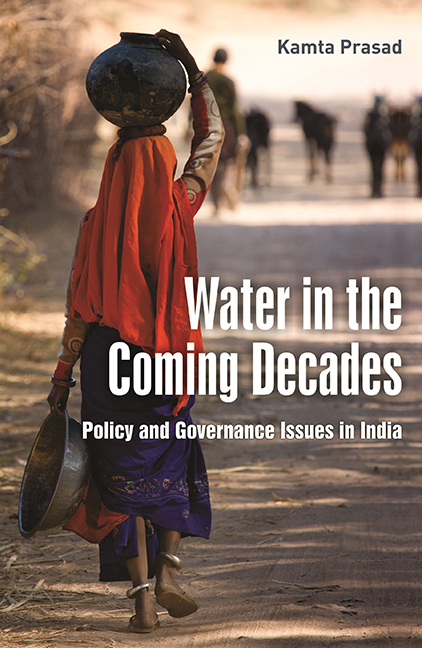Book contents
- Frontmatter
- Dedication
- Contents
- List of Tables
- List of Abbreviations
- Preface
- Acknowledgements
- Section I Overall Perspectives
- Section II Situational Analysis
- Section III Socio-economic, Institutional and Environmental Aspects
- Section IV Technological Options
- Section V Concluding Observations
- References
- Index
15 - Financial Crunch and the Quest for Private Sector Investment
Published online by Cambridge University Press: 13 July 2022
- Frontmatter
- Dedication
- Contents
- List of Tables
- List of Abbreviations
- Preface
- Acknowledgements
- Section I Overall Perspectives
- Section II Situational Analysis
- Section III Socio-economic, Institutional and Environmental Aspects
- Section IV Technological Options
- Section V Concluding Observations
- References
- Index
Summary
Issues related to financing of water resources development projects in India have not received the attention that they deserve, despite the perennial problem of shortage of funds faced by them. This chapter, therefore, provides a discussion on the same. After drawing attention to the shortage of funds available for water resource projects, the chapter explores the potential for raising funds through sources other than the government, more particularly from the private sector. The overall conclusion that emerges is that sources other than the government can provide substantial amount only if water rates are raised substantially to cover the full cost of supplying water along with a reasonable rate of return.
The financial crunch
Funds for the management and development of water resource projects in India have always been provided by the government. It was only during 1836 to 1853 of the British rule that there was a brief spell of private sector investment in irrigation projects. Two private companies, namely the Madras Irrigation Company and the East India Irrigation Company were floated by the private sector with Government standing as a guarantor. But, both the companies failed. Since then, investment in major and medium irrigation projects has been by the government only. It continued to be so after independence also. Recently, under the Rural Infrastructure Development Fund (RIDF), the National Bank for Agriculture and Rural Development (NABARD) has also started extending financial assistance to major/medium irrigation projects. However, the amount provided is quite small. Finance is also provided as loans taken by the government from international agencies such as the World Bank and the Asian Development Bank. But, this amount too has been small as compared to the budgetary support from the government. Internal funds or funds generated by the concerned projects have hardly been available in India in the post-independence period due to financial losses incurred by the projects.
Minor irrigation structures, of which tube wells constitute the most important component, are mostly owned by the private or household sector, which provides finance out of its own resources supplemented by loans from banks. The financial help provided to groundwater development through the erstwhile Agricultural Refinance and Development Corporation (ARDC) and now NABARD has been of immense help in accelerating the development of minor irrigation in India.
- Type
- Chapter
- Information
- Publisher: Foundation BooksPrint publication year: 2014



